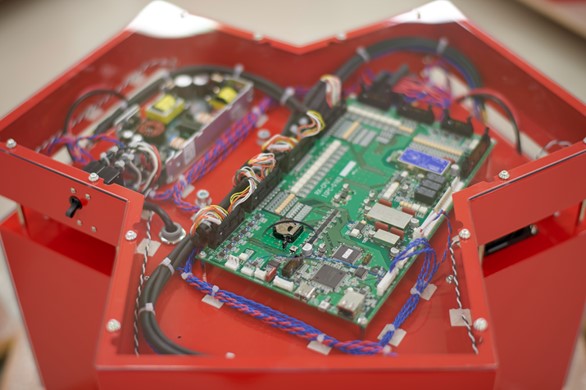Green Innovation Lab

The Green Innovation Lab is developing systems for highly-efficient energy use through the promotion of research outcomes. Originally created in 2015 as a project center to establish a research hub in the field of green innovation, it has been furthering vital developments in energy efficiency such as a power system which could potentially leap-frog current systems, and is participating in the regional government’s Kyoto Next-Generation Energy System Creation Strategy. The Green Innovation Lab was awarded ‘laboratory for vital research’ status in October of 2018 to expand its research capabilities and reinforce industry-university collaboration.
Through the careful application of external funding from multiple sources, our lab’s focus on advanced research and development in the field of green innovation, one of the programs to enhance functionality, is enabling us to accumulate a team of researchers, propose a new dynamic power distribution control system combining power electronics with advanced communication functionality, and begin improving our prototype.
With funding from MEXT* for the FY2016 Program for Enhancing Common Infrastructure of Science and Technology under the Operations for Promoting Science and Technology System Reform, we are also establishing a system that provides access to various devices in a ‘clean room’ and have received funding from the Regional Science and Technology Demonstration Base Establishment Project Supplementary MEXT* FY2016 Budget through the Japan Science and Technology Agency to propel forward the primary strengths of our university, smart-grid and related technologies (improvements in power distribution, efficiency, and conservation) as well as to put research outcomes to work and see them through commercialization. One concrete step we took in enabling this was to successfully develop the first international-standard anechoic chamber** at a Japanese national university. It is now available to regional industries and will enable them to perform product and vehicle tests under the guidance of experts with iNARTE-EMC (The International Association for Radio, Telecommunications and Electromagnetics) engineer qualifications. This facility will contribute to the creation of innovative revolutionary power devices and equipment. Sharing equipment with local industry will lead to joint research projects and enable potential breakthroughs to go through the trial and error process from the research and development stage.
* Ministry of Education, Culture, Sports, Science and Technology
** a room designed to completely absorb reflections of electromagnetic waves.

